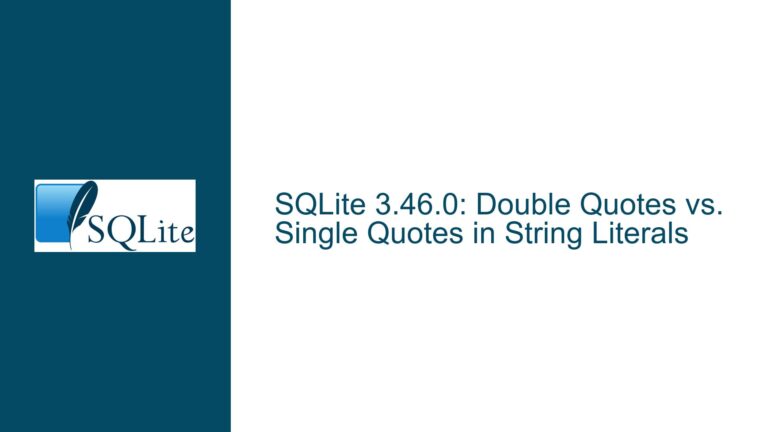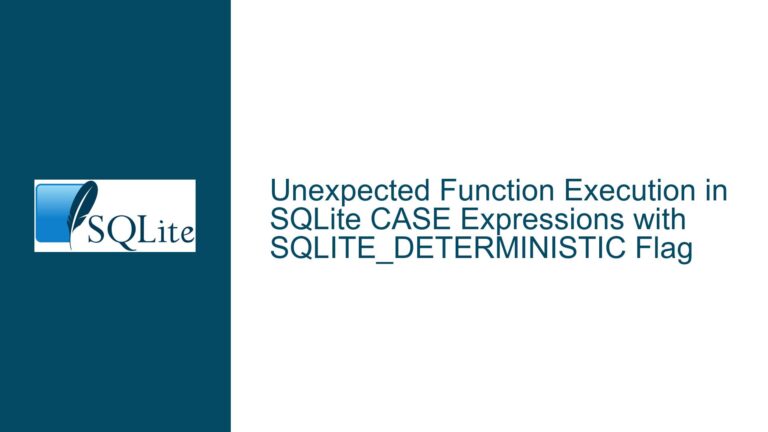Schema Qualification and Filtering with PRAGMA Functions in SQLite
Issue Overview: Schema Qualification Misconceptions with PRAGMA Functions
A common misconception arises when attempting to restrict the scope of PRAGMA functions to a specific schema in SQLite. Users often assume that prefixing a PRAGMA function with a schema qualifier (e.g., main.pragma_table_list()) will confine the function’s output to tables or objects within that schema. However, this approach does not work as intended. Instead, the schema qualifier in this context refers to the location of the PRAGMA function itself, not the scope of its output. PRAGMA functions are implemented as virtual tables and are always rooted in the main schema, rendering the schema qualifier redundant. For example, main.pragma_table_list() and temp.pragma_table_list() both reference the same underlying function, which returns results across all schemas (e.g., main, temp, and any attached databases).
The confusion intensifies with PRAGMA functions that lack explicit schema filtering parameters. For instance, pragma_table_list() includes a schema column in its output, allowing users to filter results via a WHERE clause (e.g., WHERE schema = 'main'). However, other PRAGMA functions, such as pragma_table_info(), do not expose a schema column, making it challenging to isolate results for specific schemas. This inconsistency can lead to unexpected behavior, especially when working with identically named tables across multiple attached databases.
Key symptoms of this issue include:
- PRAGMA functions returning results across all schemas despite schema qualifiers.
- Errors or ambiguous results when querying PRAGMA functions for tables with identical names in multiple schemas.
- Difficulty isolating metadata for specific schemas due to hidden or absent schema-related columns in PRAGMA outputs.
Possible Causes: PRAGMA Function Mechanics and Schema Handling
Schema Qualification as Function Location, Not Filter:
SQLite resolves schema-qualified identifiers (e.g.,schema.object) by first checking for a table, view, or virtual table in the specified schema. Since PRAGMA functions are virtual tables, they are registered in themainschema. Qualifying them with other schema names (e.g.,temp.pragma_table_list()) does not alter their behavior because they do not exist in those schemas. The schema qualifier is effectively ignored, and the function runs with its default scope.Hidden Columns in Virtual Tables:
Many PRAGMA functions expose hidden columns that are not visible inSELECT *queries but can be explicitly referenced. For example,pragma_table_info('t')includes a hiddenschemacolumn that can be filtered usingWHERE "schema" = 'main'. Users unaware of these hidden columns may struggle to filter results effectively.Inconsistent Parameterization Across PRAGMA Functions:
Some PRAGMA functions accept schema names as parameters (e.g.,pragma_table_info('table', 'schema')), while others do not. This inconsistency stems from differences in how each PRAGMA function is implemented. For example,pragma_table_list()lacks a direct schema parameter, requiring users to filter results manually.Ambiguity in Table Resolution:
When querying tables with identical names across schemas (e.g.,main.tandtemp.t), PRAGMA functions likepragma_table_info('t')may return ambiguous results. Without explicit schema filtering, SQLite defaults to the first matching table it finds in its search order (typicallytempfirst, thenmain, followed by attached databases).
Troubleshooting Steps, Solutions & Fixes: Resolving Schema-Related PRAGMA Issues
Step 1: Identify Hidden Columns in PRAGMA Outputs
Many PRAGMA functions include hidden columns that can be used for filtering. To discover these columns:
Use
PRAGMA table_xinfo(pragma_function_name)to list all columns, including hidden ones.
Example:PRAGMA table_xinfo(pragma_table_info);This reveals columns like
schema, which are not included inSELECT *but can be referenced explicitly.Use hidden columns in
WHEREclauses:SELECT * FROM pragma_table_info('t') WHERE "schema" = 'main';
Step 2: Use Explicit Schema Parameters Where Supported
Some PRAGMA functions accept schema names as parameters. Consult the PRAGMA documentation to determine if a function supports this.
Example for pragma_table_info():
SELECT * FROM pragma_table_info('t', 'main');
This explicitly targets the t table in the main schema.
Step 3: Filter Results with Subqueries or Joins
For PRAGMA functions lacking schema parameters, use subqueries or joins with pragma_database_list to isolate schemas:
SELECT *
FROM pragma_table_list()
WHERE schema IN (SELECT name FROM pragma_database_list);
This ensures results are limited to schemas known to the connection.
Step 4: Avoid Schema-Qualified PRAGMA Functions
Since schema qualifiers do not filter results, omit them to reduce confusion. Instead, use explicit parameters or WHERE clauses.
Step 5: Resolve Ambiguous Table Names
When tables exist in multiple schemas, qualify the table name with its schema in the PRAGMA parameter:
SELECT * FROM pragma_table_info('main.t');
This explicitly references the t table in main, avoiding ambiguity.
Step 6: Use Aliases for Complex Queries
For advanced filtering, alias PRAGMA functions and reference hidden columns:
SELECT t.*
FROM pragma_table_info('t') AS t
WHERE t."schema" = 'main';
Step 7: Upgrade to SQLite 3.47 or Later
Some PRAGMA behaviors are version-dependent. Ensure you are using the latest SQLite version to benefit from improvements in schema handling and PRAGMA function documentation.
Step 8: Validate Schema Existence
Before querying PRAGMA functions, verify that the target schema exists using pragma_database_list:
SELECT EXISTS(
SELECT 1 FROM pragma_database_list WHERE name = 'main'
);
Step 9: Debug with CLI Examples
Reproduce issues in the SQLite CLI to isolate environment-specific factors. For example:
.mode box
ATTACH 'test.db' AS aux;
CREATE TABLE aux.t(x);
SELECT * FROM pragma_table_info('t') WHERE "schema" = 'aux';
Step 10: Report Edge Cases to SQLite Community
If inconsistencies persist (e.g., IN clauses failing with PRAGMA functions), document the behavior and report it to the SQLite forum or issue tracker for further investigation.
By understanding the mechanics of PRAGMA functions, leveraging hidden columns, and avoiding schema qualifiers, users can effectively isolate results to specific schemas and resolve common pitfalls in SQLite metadata queries.






